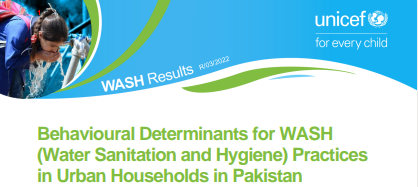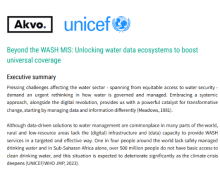WASH Results: Behavioural Determinants for WASH (Water Sanitation and Hygiene) Practices in Urban Households in Pakistan

UNICEF and the Government of Pakistan (GoP) conducted a formative research between January and November 2020 to better understand WASH practices in urban settings and identify motivations for urban Pakistanis to demand, take-up and pay for affordable WASH services. The focus was on four specific WASH behaviours, namely: i) households (HHs) seek safe drinking water solutions and water for personal hygiene, ii) HHs install appropriate septic tanks for safely managed sanitation, iii) HHs practice the safe disposal of solid waste, and iv) HHs hold WASH service providers accountable for the delivery of quality, reliable and affordable WASH services. The research identified the following key determinants influencing the key WASH behaviours mentioned above:
- Over 70% of respondents were unaware of their water quality. However, those aware were found to invest in water treatment and were most likely to use another water source (if available) in case of quality issues. They understood the link between the use of unsafe water consumption and the potential negative health and economic impacts.
- More than 85% of HHs are connected to piped sewer systems, as such the behavioural determinants with respect to septic tanks installation could not be identified. Overall, most respondents believe that the safe management of liquid waste and faecal sludge is the government’s responsibility.
- 94% of households were classified as ‘doers’ when it came to general solid waste management (SWM), however a significant number of survey respondents confirmed they were using unauthorised disposal sites (making them non-doers).
- Willingness to pay for WASH services was found to be high amongst those who were more likely to practice recommended WASH behaviours.
Key recommendations from the research include increasing support to urban WASH utilities and encouraging all stakeholders to integrate pro-poor Social and Behaviour Change (SBC) strategies into programming.




